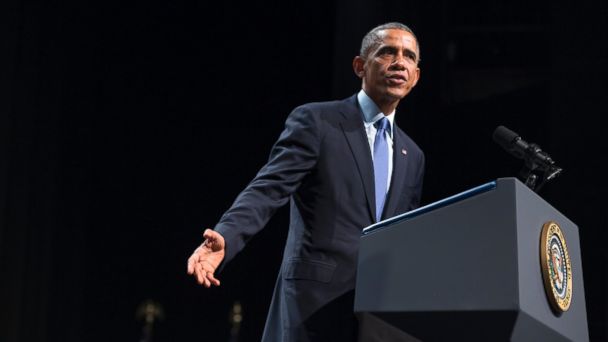President Obama Stuck as Bystander With Senate in Balance

(Evan Vucci / AP Photo)
ANALYSIS:
President Obama's agenda is on the ballot next month. This we know from the president himself.
Now we also know where that same president will actually be during the three weeks before Election Day. Barring last-minute additions, he will be nowhere near where the election is actually playing out in the most important manner: the races that will determine control of the Senate.
The White House today released a campaign schedule for the president that will take him to seven rallies for eight candidates. Each of them will be in a state Obama carried twice.
In Run-Up to Midterms, Obama Scarce From Campaign Trail
The Obama Quote Republicans Can't Stop Repeating
Trouble Looms for Obama, Democrats With Election Day 2014 Approaching
ABC News' '14 for 14': The 2014 Midterm Election Races That Matter
Only one of the rallies announced will even feature a candidate for Senate. That one is in Michigan, which sits on the outer ring of competitive races, in part because the Republican in that campaign has widely disappointed even those inside her own party.
That makes it official: no Obama campaigning in Arkansas, Louisiana, Alaska, Kentucky, Kansas or Georgia, to say nothing of South Dakota, Montana or West Virginia.
Those no-shows aren't all that surprising because none represented Obama territory even in 2008. Democrats there are staking out as much distance as possible between themselves and the president in those states. Kentucky Democratic candidate Alison Lundergan Grimes' tortured refusal to say whether she even voted for Obama is about all you need to see on that point.
Also missing, though, is any in-person campaigning by the president in races including Iowa, Colorado and North Carolina. All were part of the president's winning coalition in 2008, and two of the three he carried again just two years ago.
Based on polls, it's hard to question the decision to relegate Obama to bystander status. The new ABC News-Washington Post poll out today puts the president's approval rating at a career-low 40 percent; he's almost certainly nowhere near that number in the states with key Senate races this year.
Yet how this president came to be sidelined during a campaign stretch that could define his legacy - and will greatly impact his final two years in office - is a stark and illuminating statement on the tumultuous past six years.
Barack Obama, of course, ran as a uniter who would transcend partisan politics. He scrambled the 2008 map to carry Indiana, Virginia and North Carolina, and even pick up an electoral vote in Nebraska.
The three most conspicuous presidential absences this year carry special symbolic value for the president. Iowa made his ascent possible, in the long-ago caucuses. He then accepted his presidential nominations in the mile-high air of Denver and then again in southern Charlotte: statements, both times, of a changing nation that powered his rise.
But in 2014, his last piece of a congressional majority will be held or broken without the president playing a major role, at least in person. He's holding less than half the number of rallies President George W. Bush did when he was about to lose both the House and Senate in 2006.
White House aides say more events are likely to be added, and point out the vast number of fundraisers - well north of 50 events - the president has headlined for Democrats.
The president's political operation is also helping in less visible ways. That includes recordings and automatic calls for voter recruitment, radio call-ins that are likely to come from the president himself, and in-person campaigning by first lady Michelle Obama and Vice President Joe Biden.
One White House official said that while the "D.C. conversation" is focused on where the president will be campaigning, "our approach is different."
"Our approach to the midterms is not, 'Where can we campaign'. It is, 'How can we help,'" the official said. "We recognize it doesn't make sense to have a sitting Democratic president campaign in some of these redder states, but we have an array of ways to help win these races."
To say that Democrats aren't relying on the president, or that he's not a factor in this year's campaigns, is inaccurate.
But in the final three weeks, the president is not campaigning in the places that will actually determine whether his agenda can get any momentum in Congress again. He's neither on the front lines nor playing along the Democrats' firewall.
Democrats are looking at a grim election to close out the Obama era, in quite the bookend from the election that ushered it in. The president will be watching, if not in person.